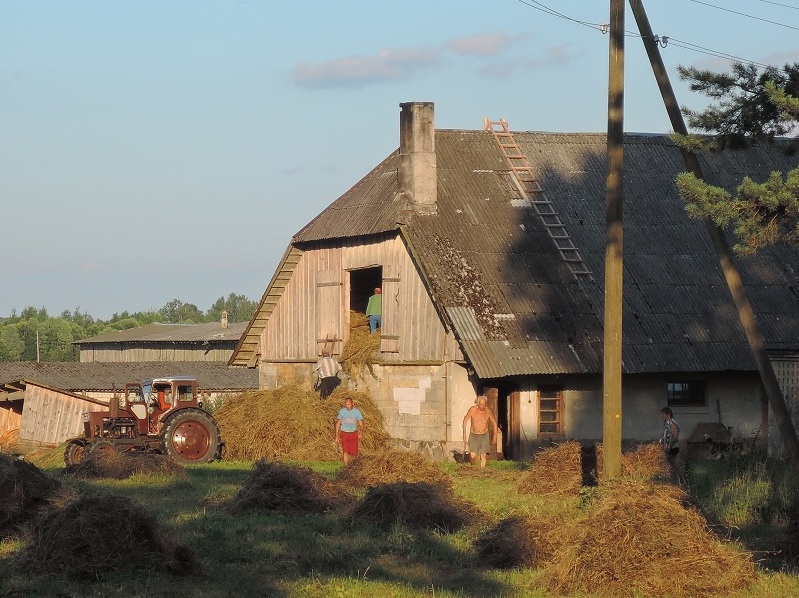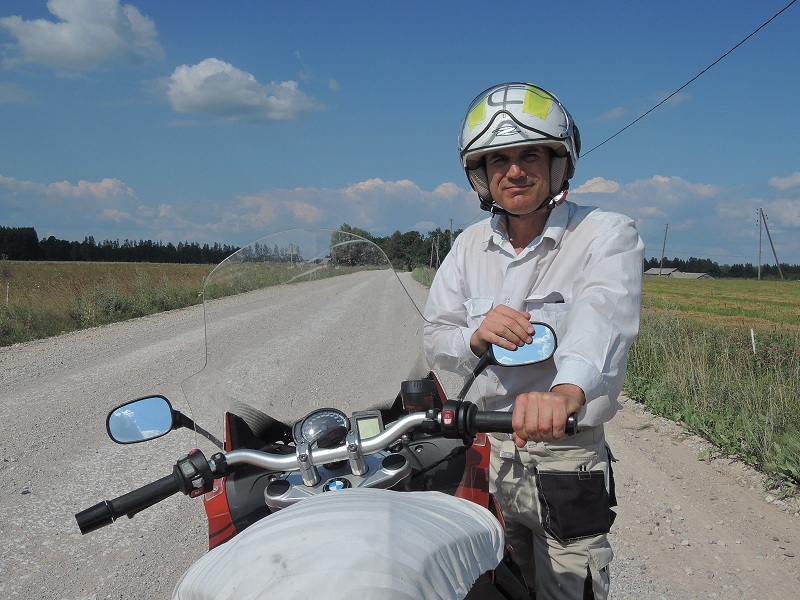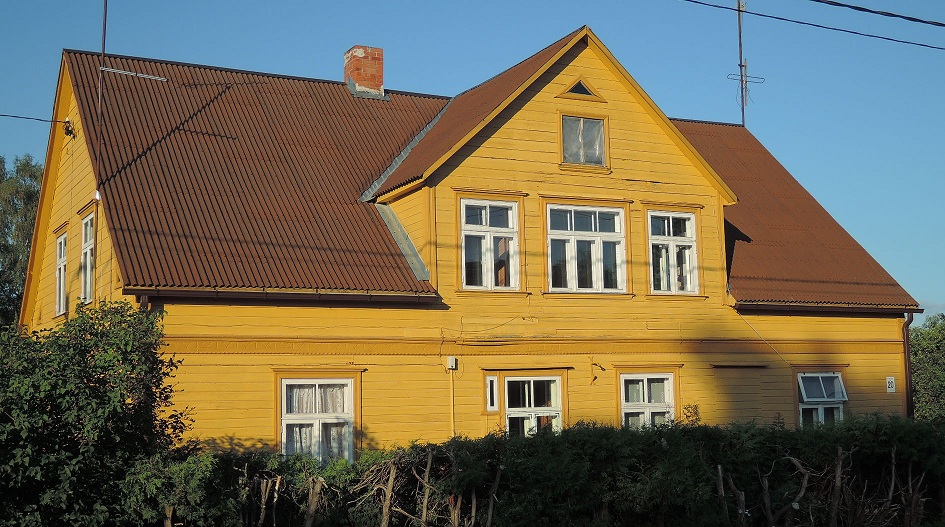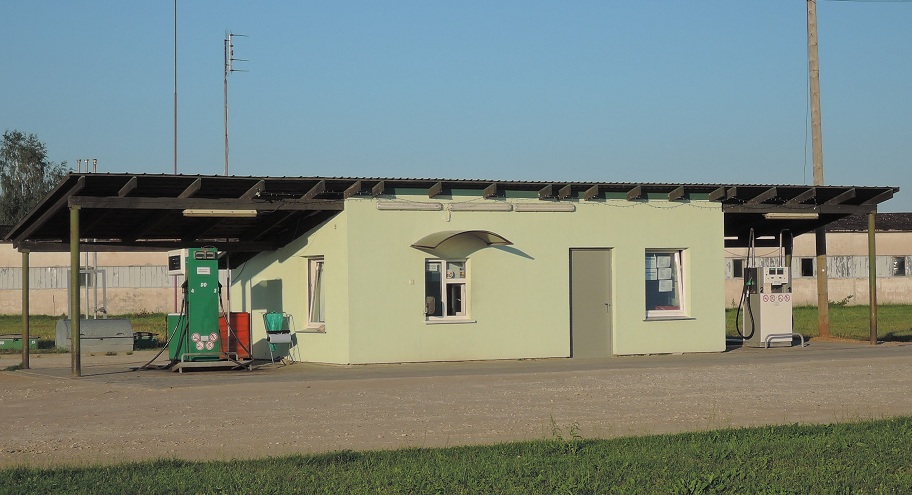The North calls me with a powerful voice, and I’m looking forward to leave Riga’s gravitational field behind, with its radial layout of roads; but before leaving, once ‘harnessed the donkey’, I stop by a souvernir shop to buy a Lethonian flag sticker for Rosaura’s top case.
From the old town it takes me a while to leave behind the city and outskirts, partly because my handy’s maps mistake the route and lead me the wrong way. Before starting this journey I was long pondering on which map service to use? Google was immediately ruled out because –despite a good cartography and directions– requires a permanent internet connection, difficult and expensive when you drive along remote regions and cross borders every few days. Another option was the paying apps, but I wasn’t sure they were trustworthy, plus the best rated don’t have application for my accursed Windows Phone 8, which is what my regrettable Lumia runs on. So, I stuck to Nokia’s own service, Here Maps & Here Drive, which are acceptable offline maps, snappy and easy to use, sometimes better than Google’s, despite making chance mistakes when showing routes, despite poor voice directions and –most important– lacking a feature for setting intermediate route points.
Starting from Riga to the northeast along highway A-2, after a while I turn off to the left on a by-road heading north, towards Estonia; and among all the several border crossings I can take, I aim the farthest one, so as to –being Latvia so small– have a chance to spend a second night in this country and get a better taste of it, if possible at some small town.
After ten days of riding on flat lands, finally the road starts becoming a bit funner, just a bit, with some low hills and very welcomed gentle corners. Roads are in quite a bad shape around here, but I like these farming lands, scarcely populated, spotted by colourful country houses and full of bucolic rural scenes. One can easily perceive that Latvia is mostly a farming country; I haven’t seen much industry even in the outskirts of Riga.
However, refueling can be a problem around here. Not that gas stations are scarce, but there are few, often not signposted, and a biker should be on the watch and not rely too much on luck; i.e, unlike me, who have been very close to an empty tank: the map pinpointed a station, but it wasn’t easy to find, a paltry petrol pump, old and rundown in the middle of a plot resembling from afar a sown field, and a scrapyard from shorter distance. I stop by the only hose, plug it into the tank and press the handle, but I don’t get a drop. If I can’t fill up here — I say to myself — I’ll have to borrow some petrol from the peasants. I walk to the office, a squalid hut thirty metres away, and try to peep through the window’s shut glasses. A lady inside shows up and I ask her, by signs, to switch the pump on, but she tells me in Russian something I can’t understand; though I have a gess. I keep gesturing and then she rubs her fingers and says, in English: ‘money money’ Damn suspicious! Instead of filling up as I was planning, I just pass her a five Euro bill, good enough for one hundred kilometres.
Another problem around these quiet region is that you never know when you’ll come across a dirt road. Suddenly asphalt ends and gravel begins; which is exactly what has happened to me.
I stop after five hundred metres and, before carrying on, I study the situation. On a closer look to the map, indeed I realize it tells of an unpaved stretch seventeen kilometres long. Driving slowly, road metal isn’t too dangerous, but quite annoying; worst of all: you can get a flat tyre in a blink. I wouldn’t like that here, in the middle of nowhere. Rosaura is not an off-road bike, and I’m not equipped for this kind of riding. On the other hand, going back and looking for a detour would be too long; so, I take the risk, seeing the gravel is quite small. At the beginning everything goes ok, riding slowly on third gear; but after a while rubble becomes bigger. I downshift and carry on slower, trying to avoid the bigger debris. Going like this, distance and time seem endless. There’s a paved stretch that gives me a break and some heart, but then again we come to road metal, with even larger stones and boulders than before, making it hard to steer the bike. I put first gear and ride almost at walking speed. This way I’ll never reach the end, think I. But no: there’s an end to everything, and fortunately things get better for the last two kilometres, until eventually I come to the asphalt again. It wasn’t that bad, after all, but it’s been a worrying while and I learn my lesson.
Shortly after, I arrive to a small town called Mazsalaca, at where I decide to stay overnight. The place reminds me somehow those towns in the Westerns: half a dozen very wide streets, flanked by wooden buildings, not too many people around (mostly pedestrians), some scattered houses a little apart and the country all around. On a street under construction there’s a charming hotel, the only one in town: it’s a wooden, worn out building in ochre, the paint flaked off the walls, with a restaurant in the ground floor. Because I’m sweaty and hungry, first of all I order something to eat: a salad, a nourishing borsh and a beer, served lovingly chilled. The waitress is very young and pretty, blond –normal here– and with big blue eyes, the like I’d rarely seen before, smiling of their own when looking at me. Fortunately she can speak English and we talk a bit while I’m eating. Upon asking her to show me a room, she leads towards the back door. I follow behind, mesmerized by her hipswinging as we climb up the stairs, and by her subtle — very subtle body odour. I wish the steps never ended…
We cross a few doors and reach the room, very simple: two small beds, shared bathroom and a cute window looking over the street, without any blinds or shutters, as usual in these countries. The price, fifteen Euros. Of course I take it; I would even if she asked me thrice that much. Natalia, who works here for the summer only and will go back to college in September, tells me about the keys: this one for the entrance, this one for your room, if you need something just ask me. Yearning for my past youth, I thank her and watch her walking downstairs…
Once settled in, I stroll along the road that I intend to take tomorrow, which heads north towards the Estonian border, merely twenty kilometres away. According to my maps, it’s a dirt road, but as far as I’m walking –two or three kilometres–, I’m stepping on asphalt; so, I don’t know what to think. Maybe it’s been recently paved? I try to ask some neighbours, but they either don’t understand me or don’t know. I’m finding Latvians to be somewhat dry; not surly but not friendly either; generally speaking, that is. Or course there are exceptions everywhere, but these people seem to rarely smile, never greet you and seldom say hello back.
Along my walk I see beautiful houses, bucolic scenes and fields of wheat still green, only a shade yellowish. There’s also a gas station with two pumps, the biggest around.
When I come back I want to ask Natalia about the road and the pavement, but she’s already gone, shutting down the bar behind her. Then I go to a small supermarket nearby, full of kids just out of their classrooms, and do some small shopping: a few supplies for a light dinner in my room. They’re pretty; they’re really pretty, these Baltic women.
When I finally return to the hotel I take a well deserved shower and have my supper. With this and that, it’s already beyond ten in the evening, but the sky is quite bright yet. As I travel north, every day the latitude is more noticeable. Now I’m at the same level as Scotland.
I read and write for a while, beyond midnight, and it’s still light up there, which doesn’t help for an easy sleep; worse yet if you have insomnia. Not a single noise can be heard from the street, nor in the house either. I’m the only guest at the hotel. I finally become sleepy while wondering, who else goes through here?, besides a chance, shy rover like me, what other travelers would ever stop by this remote, lonesome town..?





